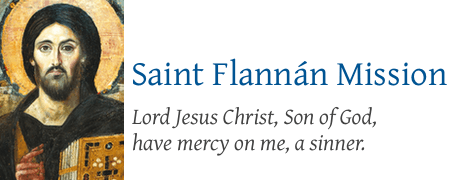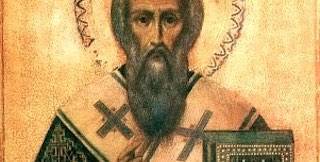St Porphyrios of Gaza – Forgiveness begins
 In the Name of the Father and of the Son and of the Holy Spirit, one God. Amen. Dear beloved, let us remember Saint Porphyrios, bishop of Gaza. Saint Porphyrios, pray for us.
In the Name of the Father and of the Son and of the Holy Spirit, one God. Amen. Dear beloved, let us remember Saint Porphyrios, bishop of Gaza. Saint Porphyrios, pray for us.
Saint Porphyrios, who lived a life of miracles, including healing by our Lord, lived to a ripe old age. Even when he was near the end of his life, he kept to his Faith, and protected his flock his last 25 years from the cruel and vengeful pagans who would disturb them. Through his prayers, many miracles and healing occurred. The saint reposed in 420 AD. As we commemorate the saint, let us remember that the saint was also the bishop of Gaza, and may the saint pray for the Middle East, where many of our Orthodox brothers and sisters are not just harassed by heretics, pagans and the insane, but are even murdered daily. May our Lord bless them and keep them strong in the Faith, even to martyrdom.
This is the Maslenitsa, or Cheesefare week, the week before Great Lent starting on Clean Monday, the coming Monday. This sunday is also Forgiveness Sunday, when we ask for each other’s forgiveness for all the debts and grievances we cause one another, “If you forgive men their trespasses, your heavenly Father will forgive you; but if you do not forgive men their trespasses, neither will your heavenly Father forgive you your trespasses” (St Matthew 6:14-15). Clean Monday, right after Forgiveness Sunday, symbolizes our starting of the Great Lent, forgiven, and clean for the spiritual journey ahead.
Our father among the saints, Saint Seraphim of Sarov, talked about forgiveness in this manner, from Volume 1 of the Little Russian Philokalia:
“For whatever kind of offense, we must not avenge for ourselves. Instead, we must forgive from our hearts no matter how much our hearts say otherwise, by convicting our hearts to the Word of God, and pray for them: ‘If you forgive men their trespasses, your heavenly Father will forgive you; but if you do not forgive men their trespasses, neither will your heavenly Father forgive you your trespasses (St Matthew 6:14-15). We must not nurse in our hearts malice or hatred towards someone who bears ill-will, but love him as much as possible, do good, following the teaching of our Lord Jesus Christ, ‘Love your enemies, do good to them that hate you (St Matthew 5:44). And so, if we will strive as much as we can in our power, to fulfill all these, then we may hope that Divine light will shine early in our souls, opening to us the path to the Jerusalem on High.”
Our father among the saints, Saint Nikolai Velimirovic, wrote this beautiful poem to teach us the power of forgiveness in relation to prayer and fasting:
“That God may forgive us, let us forgive men.
We are all on this earth as temporary guests.
Prolonged fasting and prayer is in vain
Without forgiveness and true mercy.
God is the true Physician; sins are leprosy.
Whomever God cleanses, God also glorifies.
Every merciful act of men, God rewards with mercy.
He who returns sin with sin perishes without mercy.
Pus is not cleansed by pus from infected wounds,
Neither is the darkness of the dungeon dispelled by darkness,
But pure balm heals the festering wound,
And light disperses the darkness of the dungeon.
To the seriously wounded, mercy is like a balm;
As if seeing a torch dispersing the darkness, everyone rejoices in mercy.
The madman says, “I have no need of mercy!”
But when he is overcome by misery, he cries out for mercy!
Men bathe in the mercy of God,
And that mercy of God wakens us to life!
That God may forgive us, let us forgive men,
We are all on this earth as temporary guests.
Saint Isaac of Syria, said, “Conquer evil men by your gentle kindness, and make zealous men wonder at your goodness. Put the lover of legality to shame by your compassion. With the afflicted be afflicted in mind. Love all men, but keep distant from all men.”
What greater forgiveness than from the tender mercy of God (Jeremiah 31:31-34)? Let us call upon the Holy Name of Christ our Lord and Savior often, for the cleansing of our sins, “Lord Jesus Christ, Son of God, have mercy on me, a sinner”.
Let us close by praying the thanksgiving prayer:
It is truly meet to call thee blest, the Theotokos, ever blessed and most pure, and the Mother of our God. More honorable than the Cherubim, and more glorious than the Seraphim, without corruption thou gavest birth to God the Word: True Theotokos, we magnify thee.
O virgin Theotokos, rejoice; O Mary full of grace, the Lord is with thee. Blessed art thou among women, and blessed is the fruit of thy womb, for thou hast borne the Savior of our souls, Jesus Christ our Lord. Amen.
Fr Raphael+
Readings
Jeremiah 31:31-34
Psalm 93:1-5 (LXX 92)
St Luke 23:44-56
St Jude 1:11-25

